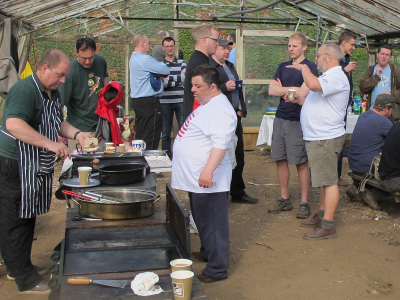In conversation with a friend yesterday, I heard once again that I am not a member of 'a church'. I didn't record the exact words but the sense was that I'm unusual in not belonging to 'a church', that it's a bit quirky and perhaps not a good thing.
And the day before yesterday I was listening to another conversation about 'a church' buying a building.
Of course, it's certainly not the first time I've heard these things, and I'm sure it will not be the last! But it's worth thinking this through again. What is 'church'? What is 'a church'? And what does it mean to 'belong' to church?
Organisations - The idea goes that there may be several churches in a small town. St Neots has about 30 000 inhabitants and in the UK some 1.5 % of people are involved in church activity. That suggests about 450 church members in St Neots.
There's an assumption here, so widespread and commonly held that we barely notice it. The assumption is that church is an organisation and that the people belonging to it are going to meet in a particular place once or twice a week. Clearly there may be several such organisations in a town and each may meet in a separate place.
Only one church - But Jesus was clear that there is only one church. He said, 'I will build my church'. That is singular - one church. A common way around this is to think in terms of 'the church universal'. True - there is one worldwide church and it necessarily meets in many places. But a problem with that idea is that the New Testament authors wrote of the church in a town, Ephesus or Rome for example. Yet we do not anywhere read about a church in Ephesus or in any other place, it's always the church. It seems clear that Paul thought in terms of one church that met in various homes, towns and provinces.
He does not think in terms of two or three different organisations in Ephesus called church (though the people probably met in several homes). Nor does he anywhere distinguish different 'churches' on grounds of doctrine, teaching, founder or understanding. On the one occasion he does mention this he regards it as a very bad practice that needs to be nipped in the bud.
'I hear', he writes to the church in Corinth, 'that you are saying that you follow Apollos or Paul or Jesus'. He sees this as a terrible precedent, a horrid disfigurement of Christ's body, he insists the practice must end immediately (1 Corinthians 1:9-17).
Church in the biblical sense is clearly a community, not a building or an institution. The Greek is ἐκκλησία (ekklesia) which means, literally, the 'called-out' ones. We are called out from the world into the community of the King. As we live (and meet) together we are part of this one community.
Being a member - So, in what sense am I not in a church, not a member of a church? And in what sense does a church need a building of its own?
If we think in terms of the Baptist Church, The Methodist Church, the Anglican Church, River Church, Open Door Church and the range of other 'churches' in St Neots then I am not a member of any of those. And Paul, I suggest, would have vehemently argued that we should all come to our senses and recognise that Christ is not divided.
Instead, I am a member of the church in St Neots, a statement Paul would have understood and surely applauded. It would be a mistake to suggest that because I'm not a member of this part or that part I am therefore somehow not a part of the whole. On the contrary, by being a member of a selected part I would be separating myself from every other part.
I have good, useful contact every week with a variety of people from several of the 'churches' and from none. We talk together, pray together, read together, sometimes we sing together, and we are being built together day by day into one body here in St Neots. I need and want nothing more. Jesus calls me to nothing less. I am a member of the church here in St Neots, the town where I live.
Questions:
- In light of 1 Corinthians 1:9-17, how do you justify denominations?
- If you disagree with my views in this article, where do you think I have gone wrong?
- How do you explain Ephesians 4:1-6 and Ephesians 4:11-16?
- What did Jesus mean by 'unity'? (See John 17:20-23)
See also:
- Church is a network - Journeys of heart and mind
- Corporate one anothering - Christ centered christianity
- Definition: church (or ekklesia) - The assembling of the church
- Ekklesia and the kuriakon, The - The assembling of the church
- Existence of many denominations* - GospelWay
- Making a mess of the church? - The assembling of the church
- Oneness and reconciliation - Journeys of heart and mind
- Scrap 'small groups' - Allergic to BS
- Simple gathering of believers - Journeys of heart and mind
- Unity begins and ends in Jesus Christ - The assembling of the church
- What's in a name? (Repost) - Journeys of heart and mind
* Note: I think the conclusions are somewhat rigid but the arguments are worth considering.







